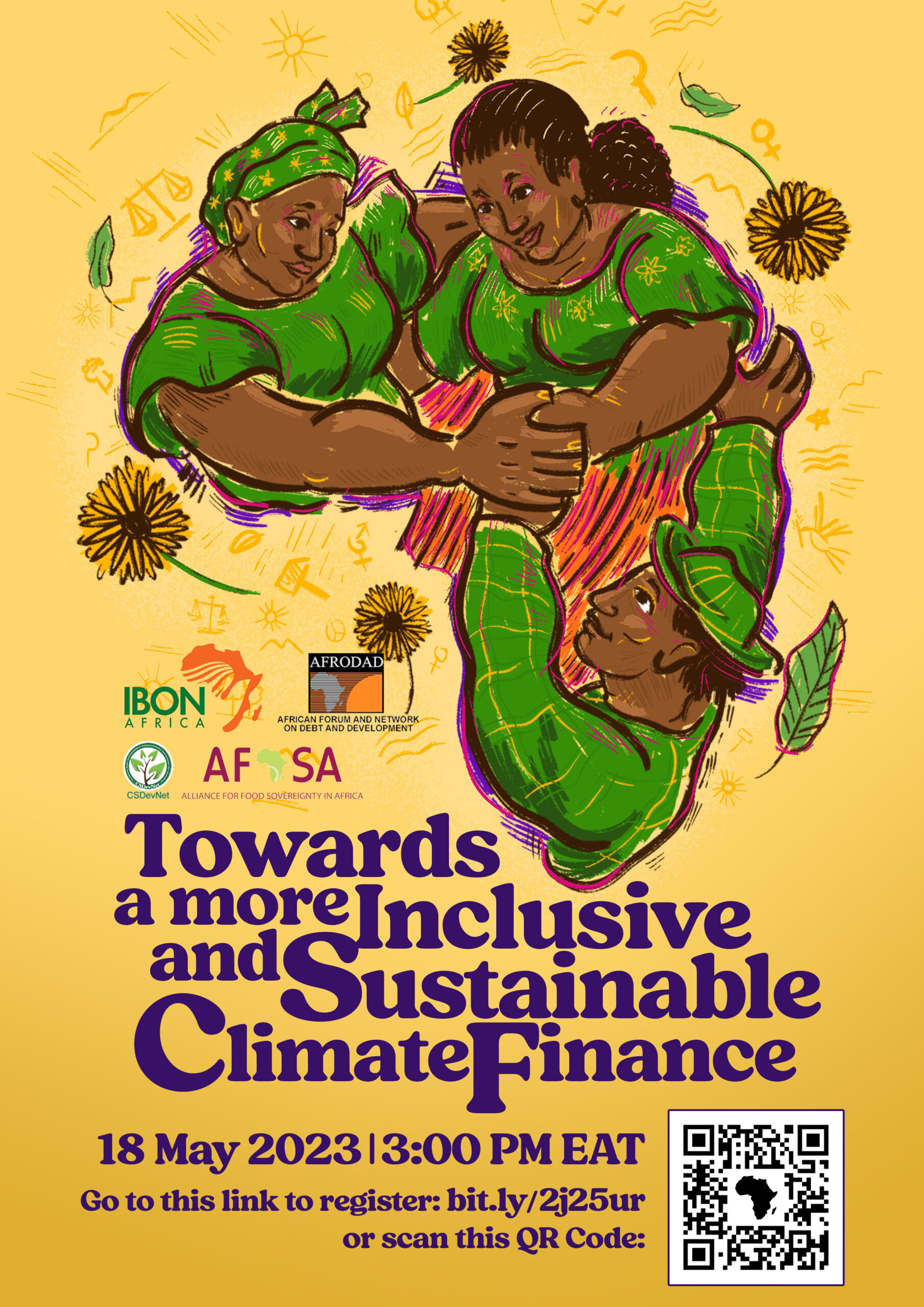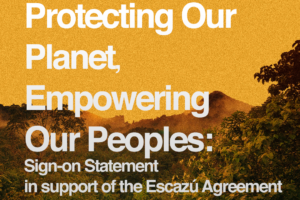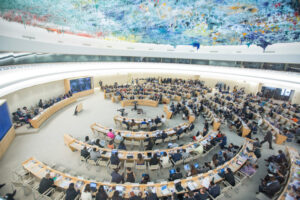Nairobi, Kenya – IBON Africa, a regional organisation advocating for climate justice and sustainable consumption and production, conducted the virtual side event “Towards a more inclusive and sustainable climate financing” ahead of the 2023 Annual Meeting of the African Development Bank (AfDB). The Side Event was held on May 18, 2023.
The webinar unpacked the AfDB’s Public-Private Partnerships (PPPs) model and its implications to climate finance. The session also developed advocacy messages that civil society organisations (CSOs) can use during the Annual Meeting and other regional fora.
The side event was co-organised by Africa Forum and Network on Debt and Development (AFRODAD), Alliance for Food Sovereignty in Africa (AFSA), and Climate and Sustainable Development Network (CSDevNet).
Examining global challenges and opportunities in climate finance
Ivan Enrile, Programme Manager of IBON International, expressed apprehensions regarding the increasing involvement of the private sector in climate financing. Enrile highlighted the need to de-emphasise, reduce, and re-evaluate the private sector’s role in this domain. They called for a clearer definition of climate finance and urged CSOs and other development actors to assert that climate finance must be additional to existing Official Development Assistance (ODA).
Enrile’s concerns reflect a broader discussion within the climate-oriented community, highlighting the need for transparent and accountable approaches to financing initiatives aimed at addressing climate change. As the global community strives to meet its climate targets, the role of CSOs and social movements and their collective engagement and vigilance in shaping climate finance strategies become increasingly significant.
African CSOs offer insights and analysis on multiple crises
Leonida Odongo from Haki Nawiri Afrika kicked off the conversation by presenting the root causes of Africa’s climate crisis. She pointed out the historical injustices that got Africa into the debt-climate crisis trap. This includes the implementation of neoliberal policies such as trade liberalisation, profit extractives of public services, unsustainable production and consumption practices, and deepening global inequalities, among others.
Mwaura Kaara from the Social Development Network then discussed how the AfDB exacerbates Africa’s multiple crises. He mentioned that challenges remain in aligning investments with climate considerations and in creating an open and inclusive space for engagements. He insisted that AfDB needs to incorporate the expertise and perspectives of CSOs in its decision-making processes, in the spirit of enhancing transparency, accountability, and the effectiveness of initiatives.
Lastly, Adrian Chikowere from AFRODAD tackled the implications of the PPP model of financing, including but not limited to skewed debt analysis, project cost inflation, undermining of democratic accountability, high user fees, and the commodification of public goods. He recommended that AfDB and governments end the privatization of public goods and basic social services as well as fully address the negative impacts caused by ill-advised PPPs within the region.
Towards inclusivity and sustainability
In the webinar, climate justice advocates also shared key recommendations to drive sustainable change.
To development banks and donor governments:
- Stop financing projects that are harmful to humanity and ecological balance, such as fossil fuels, waste to energy incinerators, carbon capture, and megadams;
- Support community-based responses as people on the ground are most impacted by the climate crisis, including for regenerative options such as renewable energy and agroecology that are sustainable and cheap;
- Provide more finance in the form of grants instead of loans for adaptation action;
- Cancel debts and end conditionalities that further worsen climate vulnerability;
- Ensure climate reparations and loss and damage payments; and
- Exercise oversight and accountability over projects under co-financing and financial intermediaries.
To Africa policymakers:
- Governments, both at the national and local levels, should involve relevant stakeholders, especially CSOs and peoples’ movements in decision-making for sustainable development;
- Ensure a people-centered engagement that is inclusive, gender responsive, transformative and rights-based;
- Develop policies that pay attention to the environmental needs of people and are responsive to their needs;
- Ensure enforcement of policies that support the poor and the marginalised sectors; and
- Shift away from investing in systems that are not working for the people and which continue to exclude the voices of those most impacted – put people before profits.
To communities:
- Mobilise and organise to build peoples’ movements that rally for system change;
- Advocate for an enabling environment where activists, especially women and youth, can freely and openly assert demands to genuine sustainable development; and
- Foster solidarity and support and promote community-led alternatives that contribute to addressing the climate crisis and unjust trade practices.
Re-watch the webinar here. Presentations are also available for download here.


